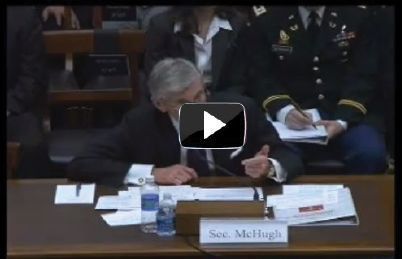Randy's Blog
RSS Feed|
Secretary of the Army: M&S is Absolutely Critical
Posted by
Randy
|
March 08, 2011
Last week during a hearing in the House Armed Services Committee, I asked Secretary of the Army John McHugh how important modeling and simulation is to the Army and what kind of future he sees for this technology. Secretary McHugh's comments are critical. Modeling and simulation technology is so important to our United States military as we face both the realities of significant budget constraints and twenty-first century warfare. As the founder and chairman of the Congressional Modeling and Simulation Caucus, I have championed the use of this technology in our military. I’ve also joined with other Members of Congress to look at ways to take modeling and simulation beyond the battlefield by increasing collaboration around this technology as a tool to better respond to national catastrophes, both natural and man-made. You can read more about modeling and simulation here.
Users are solely responsible for the opinions they post here and their comments do not necessarily reflect the views of Congressman Forbes.
Post a Comment
We encourage you to analyze and comment on the posts featured on this blog, but please understand that comments which include campaign content, engage in personal attacks, or include vulgar, profane, obscene, or inappropriate language will be removed from the site. Please note that there may be a brief delay in the publication of your comment.
|
SEARCH BLOGRECENT POSTS11/09/2012 - Which “Fiscal Cliff” issues are you most concerned about?11/02/2012 - A Memo on Jobs in Virginia's Fourth District 10/27/2012 - Hurricane Sandy Resources 10/23/2012 - What do you believe are the most serious negative impacts of having a Navy that is at its smallest size since 1917? 10/19/2012 - A Game Changer for Virginia 10/12/2012 - Question of the Week: Do you support the administration using taxpayer dollars to re-imburse legal fees to defense companies for failure to comply with the WARN Act? ARCHIVESBy YearBy Issue
|
Services
- Help with a Federal AgencyReceive assistance with matters related to the federal government.
- Request a FlagRequest to have a flag flown over the Capitol in honor of someone you know.
- Help with Federal GrantsGet information regarding federal funding opportunities.
- Visit Washington DCFind information on obtaining Capitol and White House tours.

 Congressional Modeling & Simulation Caucus» LEARN MORE
Congressional Modeling & Simulation Caucus» LEARN MORE Congressional China Caucus» LEARN MORE
Congressional China Caucus» LEARN MORE


